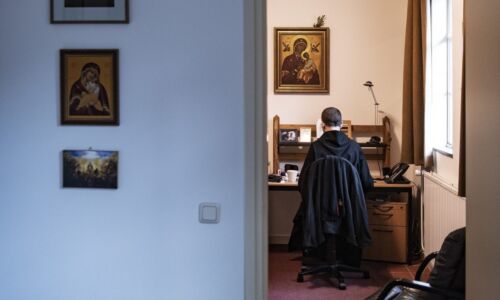The relaxed professors’ neighbourhood
-
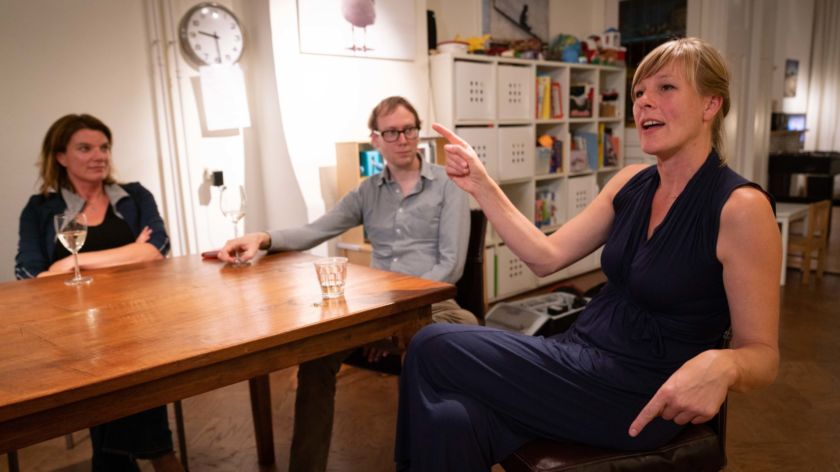 Karin Roelofs, Floris de Lange en Roshan Cools. Foto: Erik van 't Hullenaar
Karin Roelofs, Floris de Lange en Roshan Cools. Foto: Erik van 't Hullenaar
What does the life of a professor at the Donders Centre for Cognitive Neuroimaging look like? Is it a daily race against the clock? It turns out that psychologists Karin Roelofs, Roshan Cools, and Floris de Lange are dedicated to balancing their work and private lives. 'On a beautiful day I might say, ‘Right, turn everything off,’ and then go for a walk with my mother.'
‘A professorship evokes strong associations in people,’ notes Floris de Lange (41). ‘When my neighbour heard that I had become a professor, he told me a story about another professor who, according to him, was being very pompous about it. It sounded a bit as if he wanted me to say that I would never do such a thing.’ The prevailing image of professors is that they are elitist, inaccessible, and boring. ‘When camping, I never tell anyone I am a professor,’ says Roshan Cools (43). ‘Because then they treat me like I’m from another planet.’ Karin Roelofs (46): ‘I always refer to myself as a ‘researcher’, but then people ask me if I’m writing a thesis. I just tell them that I’ve already finished it, haha!’
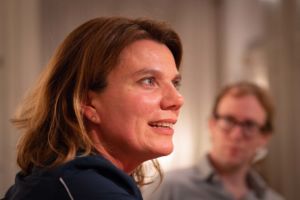
The careful handling of the outside world says little about their academic ambitions, or so it seems. Roelofs became a professor when she was 39, Cools when she was only 36. De Lange was recently appointed (‘I’m still wearing a borrowed gown’). All three – after having gained international experience – are currently leading successful research groups at the Donders Institute and are world famous for their neuroscience work. They publish in top scientific journals such as Biological Psychiatry, Nature Reviews Neuroscience, and eLife.
On this late summer evening, we are speaking to the three scientists about the work pressures professors experience in the year 2018. Location: Postweg Nijmegen, the street in which all three of them live – you could almost call it a real professors’ neighbourhood.
Despite their impressive academic performances, the message they want to pass on to young researchers and students is a nuanced one: relax and make sure you are doing something you like. In the words of Neuropsychology professor Cools: ‘Let go. We are far too preoccupied with the idea that you must always do your best.’ That insight stems from another similarity: the three young professors all have families, with children between one and twenty-one years old. Family comes first and they plan their work around it as best they can.
Let go?
Cools: ‘Tomorrow, I happen to be giving a talk to eight hundred PhD students in Groningen. The title is: ‘Relax’. You cannot always focus intensely. If you are tired, that is a signal from your brain to let go of that focus for a while. This will give you the ability to grab hold of unexpected opportunities. Working pressure and burn-outs are real problems, but we should actually listen more closely to our brain signals.’
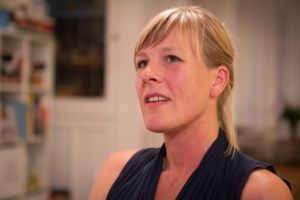
‘Of course, I have also experienced stress, like when I was a postdoc at Berkeley and was talking with my supervisor about the tension involved in searching for a job. Should I go back to Europe? To the Netherlands? What’s the right decision? He said, ‘What are you worrying about? What’s the worst that could happen? Live in the present; do the things you want to do now.’ So I went to Cambridge, and then this job came along, which turned out to be a brilliant opportunity.’
Roelofs recognises Cools’ stress in making a decision. ‘I turned down a professorship here in 2011; I was an associate professor in Leiden at the time. It made me feel very anxious, I had just had two small children. I was still breastfeeding the youngest one. ‘So maybe I won’t become a professor. That doesn’t have to be the career path that I choose.’ And then we went cycling in Asia with the family for two and a half months – with the youngest in the bike trailer behind us. A wonderful time!’
‘I didn’t want to work eighty hours a week – because that was the image I had,’ continues Roelofs. ‘I also didn’t have a good female role model. Later, my mother said, ‘But then why not show people your way of doing it?’ When I was given the opportunity to become a professor here four years later, I jumped at the chance.’
How do you deal with an eighty-hour working week like that? How do you deal with working pressure in general?
‘I work a lot of hours,’ confesses Roelofs, ‘but I make sure I maintain a good work-life balance. Like yesterday, when it suddenly got really nice outside. I said: ‘Right, turn everything off,’ and went for a walk with my mother.’
De Lange: ‘Work hard, play hard?’
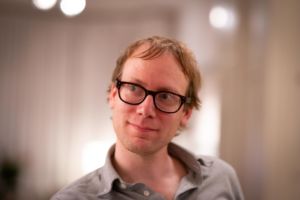
Roelofs can’t help but laugh. ‘Yes, I think I do live my life rather intensely. But life should always be fun I think; that is something I find important in my research group as well. My PhD students know that too. Wednesdays, for example, are sacred to me. That is when I work from home. Even if there is a job interview going on. Even though nothing requires me to be home on that day anymore – I used to pick my children up from school at noon – I really need that balance in the week. I can make my own coffee and work in peace.’
Cools: ‘I also tell my PhD students: just stay at home one day during the week, especially if you have children – surely you want to be there for moments in their lives, too? I take the children to school myself nearly every morning, and pick them up again at five o’clock. On Fridays, I am at home as a rule. I don’t work more than 40 hours a week.’
Roelofs: ‘Well, I do tend go over that, especially when I have to travel a lot.’
Cools: ‘I’m also starting to do more travelling again. But it does make me feel bad. I feel like I am short-changing everyone: my PhD students, my children. When that happens, my mother says, ‘Stop worrying and off you go!”
That sounds pretty relaxed. Are the stressed students and young researchers of today very different then?
De Lange: ‘PhD students now are indeed under much more stress than they used to be. Even Master’s students often already have smoke coming out of their ears.’
‘Sometimes, you can already hear it in the Bachelor’s students!’ adds Roelofs. ‘If I don’t score an average grade of eight, I won’t get into the Master’s programme. The pressure is enormous. But I think it’s counterproductive. You can’t worry about your future and be fully focused on your current work at the same time. The stress can sometimes prevent them from really sinking their teeth into the task at hand. When I was still at NIH (the prestigious National Institutes of Health in Bethesda, USA, ed.), in America, I also worked hard, but that was because I found everything so interesting.’
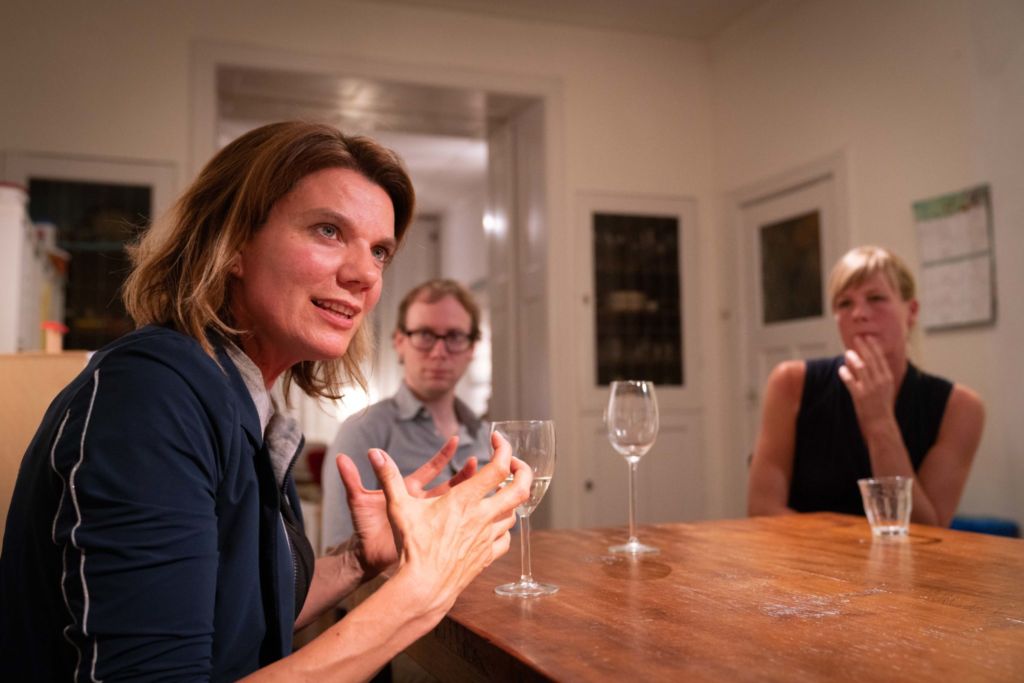
De Lange: ‘I also always recommend that students not start with their PhD right away. Take a moment to catch your breath first! They are much more ambitious than in the past. I was quite the lax student; a seven was certainly good enough for me. I recently gave a student an eight and he wanted to argue about it with me!’
Why do young people experience so much pressure?
Cools: ‘I think that it has to do with a broad social trend. It’s because of the performance society. The emphasis is very much on achievement: we can achieve what we want, as long as we do our best. People sometimes also seem to feel that they are entitled to it. But that is not the case! A large part of our lives is out of our control. Once you accept that, a different side of life will open up for you.’
‘There is also no recipe for academic success,’ observes De Lange. ‘Sometimes students ask what they need to do to become a professor. I always find those strategic questions a bit nonsensical. Just look how much the group leaders at our centre all differ from each other. There is no common denominator. I think that is also one of the fun things about our institute: people have a wide range of backgrounds, ranging from biology to mathematics. That energises the environment.’
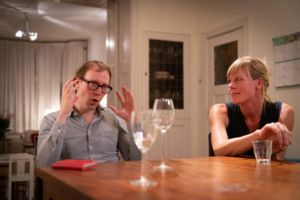
And what about publication pressure?
‘It’s a myth that a long list of publications is needed for academic success,’ argues De Lange. ‘When I worked as a postdoc in Paris after my PhD, I spent nearly a year doing virtually nothing, so to speak. One week-long experiment, but mainly listening to presentations and talking to people. That proved to be very beneficial to me. Even now I regularly have a day when I just mess about. I might read a bit, do a little bit of everything, not focused at all. You have to clear your own schedule.’
Roelofs: ‘However, that list is unfortunately still important: I also notice this in some of the grant committees I’m a member of. Someone will say, ‘There are very few publications.’ Quantitative measuring tools like that are really outdated. Quality should be what’s most important. But things are changing too slowly.’
Young researchers may suffer from much more uncertainty about their career, the professors suspect, due to the stress associated with that. It’s a stage in their lives that these professors have already moved past. Young people have to make themselves stand out to have an academic career.
Cools: ‘Of course, it’s easy for us to talk, from our luxurious, permanent positions. I do realise that. As a PhD student and postdoc, I did work very hard, but I did so voluntarily and I enjoyed it. Not because I necessarily wanted to become a professor. I wanted to spend my entire life studying.’
‘Yes, solving puzzles,’ De Lange joins in, ’that’s exactly what I want to do too. I enjoy that today, and I think I still will in fifteen years’ time. Whether that’s as a group leader or as a professor doesn’t really matter to me. Somewhere else in the world, there may very well be a more prestigious position than research leader at the Donders Institute, but will the puzzles I solve be as much fun? I doubt it.’
Yet you also only had children once you had a stable job.
‘I never postponed having children because of my career,’ says Cools. ‘You should never plan children. Parenthood just didn’t find its way to me until later on. Now I have four kids, including stepchildren. The oldest just turned 21.’
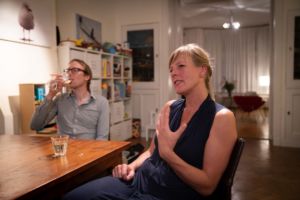
De Lange: ‘I enjoyed doing my postgraduate research abroad; it is true that I would not have done that if I had had a child. At the time I enjoyed the freedom. But that was not because I thought, ‘Let me build a career first.’’
‘Children never come at the right time,’ laughs Roelofs, ‘so I thought that I’d better have them while I am still young. I was pregnant during my Veni period, just after I became assistant professor in Leiden. That was a relatively luxurious period: I had already achieved something. But I also never purposefully set out to become a professor. I just thought it was a lot of fun to do research.’
So by the sound of it the life of a researcher isn’t half bad?
De Lange: ‘My wife is training to be an internist. She has to be at the hospital at eight o’clock in the morning, and works night and weekend shifts. I’m the one who usually cooks and takes the kids to day care and school. I always say jokingly that in our home, she is the only one with a real job.’
Floris de Lange (1977) became professor of perception and cognition this year at the Centre for Cognitive Neuroimaging at the Donders Institute – where he also did his PhD research. He conducts research into the role of expectations and previously acquired knowledge in perception, such as when we look at the world around us, by using brain scanning techniques like MRI and MEG. De Lange studied psychology and artificial intelligence. After graduating, he worked for two years at the NeuroSpin research centre in Paris, after which he returned to Nijmegen, initially as a junior principal investigator. Since 2015, he has been a member of the Jonge Akademie at KNAW (Royal Netherlands Academy of Arts and Sciences). De Lange lives with his partner and two children aged one and four.
Roshan Cools (1975) is professor of cognitive neuropsychiatry and is associated with the neuroimaging centre as well as the medical centre (Radboud university medical center) at the Donders Institute. She researches the mechanisms of psychiatric brain disorders and the effect of medication on them. After studying psychology, she conducted PhD research in Cambridge (UK), followed by postdoctoral research in Berkeley (US) and Cambridge. Cools is a member of the KNAW and the Advisory Council for Science, Technology, and Innovation (AWTI) as well as a board member of the Rathenau Institute. She lives in Nijmegen with her partner and four children aged two, six, fourteen and twenty-one. She is the third generation of Cools in a gown: both her father and grandfather were professors in Nijmegen.
Karin Roelofs (1972) is professor of experimental psychopathology at the Behavioral Science Institute of the Faculty of Social Sciences and at the Donders Institute. In her research, Roelofs looks at how people – including agents – deal with stress situations, and why they sometimes respond differently. Just as Cools and De Lange she uses tools such as the brain scanners at the Donders Institute to do so. She was trained as a neuropsychologist and clinical psychologist and was awarded a PhD in Nijmegen, then went to the NIH in the US, and subsequently became assistant professor – and later professor – at the University of Leiden. Roelofs is a member of the Academia Europaea, a European organisation similar to KNAW. She also has two children (aged twelve and fourteen) and lives in Nijmegen with her partner.


